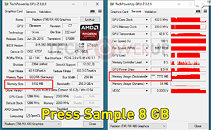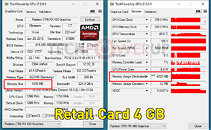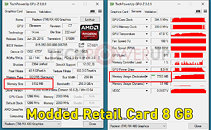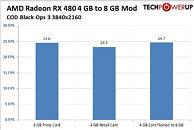Tuesday, July 5th 2016

AMD Retail Radeon RX 480 4GB to 8GB Memory Unlock Mod Works, We Benchmarked
Earlier this week, we heard reports of some early adopters of the 4 GB variant of AMD Radeon RX 480 claiming that their cards shipped with 8 GB of memory physically present on their cards, but their graphics card BIOS somehow prevented the GPU from addressing more than 4 GB of it. In its Reddit AMA, the company presented a vague answer to the question of whether such 4 GB cards are moddable to 8 GB by flashing it with the BIOS of the 8 GB variant, by stating that the ability to mod is restricted to review samples. This is both true and false. Short answer: retail 4 GB RX 480 can be flashed to 8 GB, and the modified card perfoms on par with the 8 GB variant.
AMD sent out review samples of the 8 GB variant, and to enable reviews to also put up reviews of the 4 GB variant, it sent a special BIOS that converts the 8 GB card to 4 GB, by reducing its address-space and memory clocks, perfectly simulating the 4 GB variant. AMD's claims of 4 GB cards with 8 GB physical memory being restricted to review samples was proven false when early adopters of retail 4 GB cards discovered eight Samsung 8 Gbit memory chips on their card amounting to 8 GB. We currently have an AIB partner-branded retail 4 GB Radeon RX 480 card which we bought online (invoice posted), and which we're using to prepare our 4 GB RX 480 review. We first discovered that our 4 GB retail card had the same exact Samsung 8x 8 Gb chips (including the same bin, specc'd for 8 Gbps) as the 8 GB card. We flashed this card with the 8 GB card's BIOS, and were successful in doing so. The trick here is to extract the BIOS of the 8 GB card with ATIFlash 2.74 and then transplanting that BIOS onto the 4 GB card. The 8 GB card BIOS image which we used, can be found here. Use at your own risk.To confirm that this mod works, we first tested our 8 GB review sample with its untouched 8 GB BIOS, and used that as control. Next, we tested the retail 4 GB card with the BIOS it shipped with. Lastly, we flashed this 4 GB card using ATIFlash with the 8 GB BIOS, which we extracted from our 8 GB card using ATIFlash. We ran "Call of Duty: Black Ops III," on the three. This game can consume dedicated video memory beyond 4 GB at 4K Ultra HD (3840 x 2160).
The 8 GB control and the modified 4 GB to 8 GB card performed on-par with each other. The 8 GB control card produced 24.6 fps, the 4 GB to 8 GB modified card produced 24.7 fps. The 4 GB card with its original retail BIOS produced 23.3 fps. To make sure that each GPU runs at a predictable GPU frequency (usually thermal and power limit reduces clocks), we've set both fan and power target to maximum, which results in a constant frequency of 1266 MHz on both cards.Also, to prove that the game-test (COD: Black Ops III) was able to consume more than 4 GB of video memory on the modified card, as it does on our 8 GB control card, we observed the "Memory Usage (dedicated)" graph of GPU-Z. The modified card was indeed able to address >4 GB of video memory on the card, just as it does on the 8 GB card.
In conclusion, flashing the reference 4 GB Radeon RX 480 to 8 GB works, if you're sure your card has 8 GB of memory physically present. Sadly the only way to know for sure is disassembling your card, which will definitely break some seals and void your warranty. You also need to be sure how to use ATIFlash correctly.
AMD sent out review samples of the 8 GB variant, and to enable reviews to also put up reviews of the 4 GB variant, it sent a special BIOS that converts the 8 GB card to 4 GB, by reducing its address-space and memory clocks, perfectly simulating the 4 GB variant. AMD's claims of 4 GB cards with 8 GB physical memory being restricted to review samples was proven false when early adopters of retail 4 GB cards discovered eight Samsung 8 Gbit memory chips on their card amounting to 8 GB. We currently have an AIB partner-branded retail 4 GB Radeon RX 480 card which we bought online (invoice posted), and which we're using to prepare our 4 GB RX 480 review. We first discovered that our 4 GB retail card had the same exact Samsung 8x 8 Gb chips (including the same bin, specc'd for 8 Gbps) as the 8 GB card. We flashed this card with the 8 GB card's BIOS, and were successful in doing so. The trick here is to extract the BIOS of the 8 GB card with ATIFlash 2.74 and then transplanting that BIOS onto the 4 GB card. The 8 GB card BIOS image which we used, can be found here. Use at your own risk.To confirm that this mod works, we first tested our 8 GB review sample with its untouched 8 GB BIOS, and used that as control. Next, we tested the retail 4 GB card with the BIOS it shipped with. Lastly, we flashed this 4 GB card using ATIFlash with the 8 GB BIOS, which we extracted from our 8 GB card using ATIFlash. We ran "Call of Duty: Black Ops III," on the three. This game can consume dedicated video memory beyond 4 GB at 4K Ultra HD (3840 x 2160).
The 8 GB control and the modified 4 GB to 8 GB card performed on-par with each other. The 8 GB control card produced 24.6 fps, the 4 GB to 8 GB modified card produced 24.7 fps. The 4 GB card with its original retail BIOS produced 23.3 fps. To make sure that each GPU runs at a predictable GPU frequency (usually thermal and power limit reduces clocks), we've set both fan and power target to maximum, which results in a constant frequency of 1266 MHz on both cards.Also, to prove that the game-test (COD: Black Ops III) was able to consume more than 4 GB of video memory on the modified card, as it does on our 8 GB control card, we observed the "Memory Usage (dedicated)" graph of GPU-Z. The modified card was indeed able to address >4 GB of video memory on the card, just as it does on the 8 GB card.
In conclusion, flashing the reference 4 GB Radeon RX 480 to 8 GB works, if you're sure your card has 8 GB of memory physically present. Sadly the only way to know for sure is disassembling your card, which will definitely break some seals and void your warranty. You also need to be sure how to use ATIFlash correctly.





110 Comments on AMD Retail Radeon RX 480 4GB to 8GB Memory Unlock Mod Works, We Benchmarked
Been a Radeon user for a long time!
Anyone can claim anything. It means next to a causal fart if no evidence is supplied to back it up.
Wizzard bought a retailed RX480 4GB, flashed the card with 8GB BIOS and have shown all picture proof. How about you show us the part yous said?
I particularly like how every summer they go nuts over whatever Titan card drops and go on and on about its insurmountable gaming prowess, then suddenly, around every following Thanksgiving, when a half-the-price and superior x80Ti variant comes out, we're suddenly lectured by the same people that the Titan is actually a production/compute card and was never really meant for pure gaming (although it's a bonus it games well).
Every year. Do they notice the trend?
There have been many examples of extra value added in the past:
6800 non-Ultra pipeline unlock:
www.overclock.net/t/56654/guide-to-unlock-pipes-on-a-6800nu
9500 Pro to 9700 unlock:
www.digitaltrends.com/how-to/radeon-9500-to-9700-mod-faq-a-follow-up/
6950 2GB to 6970 2GB unlock:
www.techpowerup.com/articles/overclocking/vidcard/159
It's remarkable how some people will find anything to complain about. It's even worse to have the useless KINGPIN version of a 980Ti that overclocks no better on water than a standard EVGA SSC 980Ti and then talk about how AMD "scams" gamers on a $239 RX 480 8GB card.
Using your logic Intel was scamming PC gamers back in the days by selling Pentium 4 C 3.2Ghz when Pentium 4 C 2.4Ghz could easily reach those speeds, and the same for AMD's XP3200+:
techreport.com/review/6341/overclocking-the-athlon-xp-m-2500-processor
If extra value added for mainstream/performance gamers upsets you, I am sure NV will welcome you with open arms with Titan e-Peen edition.
I was disappointed to hear the initial reports of PCIe power issues on this card, but my interest is re-piqued. This is the positive bump in the media that this card needs and I wouldn't be surprised to see people flocking to these just for the excitement that they might get more than they paid for (which is the same thing that made us love all the other "hidden performance for free" goodie bits).To be fair, it's meant for sub-zero and it's EVGA's marketing, but you're right in that a lot of people seem to buy them thinking they're going to get better overclocks on air/water. You're 110% right about everything in this post though.
EDIT: I was just wondering, the person that wrote this was a scam, was he able to keep his face straight. I mean how do you function on daily basis dude ? Its a miracle you are surviving with such IQ in today's world.
Its a scam!!! Bawahahahahaha...
Lotteries are profitable precisely because they don't give people enough payback to justify the pay-in. They only provide the illusion of doing so. Of course, this is the basis of all profitability. Businesses that give people equal value are "out-competed" by the scammers, provided the scammers are savvy enough. Business that give people more value than what the buyer paid for go out of business in short order.
The problem with lotteries that makes them worse than the general profitability scamming is that the buyer doesn't know what they're buying. Instead, they're buying a hope or a dream — via the variable reward system. That's a step worse than the buyer just not knowing what what they're buying is worth (or not being able to leverage their power to force a seller to provide equivalent product) — the basis of profitability.
It's bad business, in terms of ethics, to do things like the panel lottery in televisions. Even if it reduces the price tag to the consumer a smidgen it reduces the overall value potential of the purchase more when there is high variability in panel quality. So, the more "lottery" a purchase is the more abusive it is, particularly when it involves a large amount of money.
Since this card does not look to benefit all that much from the additional RAM and isn't a good value for Crossfire (in comparison with just buying one high-performance Pascal) the lottery effect here seems to be rather small.
1) rx480 is a decent card, but a "meh" card... nobody loves it or gets excited about it - now everybody excited.
2) gtx 1060 is about to come out - excitement about that card is forgotten for a moment
3) knowing points 1) and 2) we can assume that price drops are inevitable
so basically amd made a little price drop now, but not from position: "please buy our card, stock pile up - see we even dropped price for you, please do not make us price drop again :'( "... but now "shyt - look stock s are empty everywhere, people line up to get that "4GB" card so they can "steal/download/hack" a +4GB from us for "free" :D "
this won't last for sure so who can grab now one is lucky
As for the Kingpin point, utterly invalid. Like a luxury watch, or a sports car, I simply wanted one. I read all about it, read the EVGA overclocking forum, listened to Vince and understood unless you used exotic cooling it would reach somewhere in the 1500's and it did and that's where I game.
Again, if people want roll around calling me a Fanboy then that must be AMD's fault for not making the fastest single GPU solution. If Vega is as awesome you all hope, I'll likely move to that card.
But imagine if Vega came in two memory amounts and I bought the more expensive higher memory version only to find out I didn't need to because the lower one had the same memory.
It's not the same as fusing it off. Leaving it there is lazy. And if you charge more for an identical product that's a but unfair.
I know Nvidia have done the same in the past and released cards with more shaders under the same card model, so I'm not being blind. I'm pointing out AMD are effectively conning the initial buyers who bought the 8Gb model when the cheaper one has the same functioning memory.
So once more, if anyone is capable of logic, its great news for the 4Gb owners but it is a 'little' unfair on those that paid extra for the 8Gb model.
problem is shipping charges cost more than difference...
EDIT: Oh and i forgot to add that FE addition example, where people were scammed into paying $100 extra to Nvidia for a card that had nothing extra over reference card and i also forgot to mention about how GTX 1080 customers were further scammed by "retailers" overcharging them for the same overcharged FE card for more than $300 dollars extra. I think we both can agree paying $30 extra and missing out on a lottery is nothing compared to an actual daytime scam that happened in front of everyone. (I think it is still happening no ?? )
EDIT 2: You know, i thought about your response once again and thought how it would have felt to be an SLI customer - EVGA charging extra for some highend SLI Bridge that promises extra performance but when you read Techpowerup review you see it does nothing extra. - Is it called scamming people into buying same stuff but charging extra ? NO ?